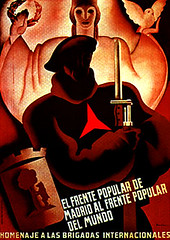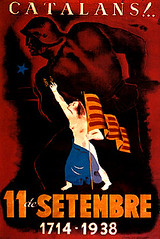Linklater
In the offline world Staurt Klawans has a good description of the "situation" at the heart of Richard Linklater's new adaptation of Philip K Dick's 1977 novel, Through A Scanner Darkly: "Kenau's character let's slip his sense of identity -- as you'd expect of a drug-addicted undercover narc assigned to carry out intensive surveillance on himself." You would indeed!
In fact, in this tightly conceived scenario Dick and now Linklater pack in so many degrees of self-fissure, it's almost hard to keep track. In this world, the cops wear continually shifting "scramble suits" that conceal them as a vague blur of ordinary looking people. This is essential to the premise -- while undercover the cop is concealing his identity as Fred the cop, pretending to be a user; on the job, Fred is hiding the fact that he's the addicted-Bob Arcter, who he then is forced to "investigate," spending more and more of his time, as the movie progresses, (covertly) monitoring (a version of) himself on a surveillance screen -- the title's scanner.
"Substance D," the fictional drug in the film, is at once located in the specfic drug culture of the 1960s and allegorically generalized (people often refer to the drug simply as "D" or sometimes "Death"). It suggests any number of levels of addiction, addiction to any life-destroying aspect of our culture for instance, or, perhaps,"addiction" to life or to culture itself. Does any thinking person summon up some version of the Bob Arctor/Agent Fred divide -- an estranged part of our selves, criminal, gestural, vague, out of time, and a reflective part, the part that continually thinks about "who we are," and, in a manner of speaking, sets up shop in a surviellance post, monitoring all of, say, awol's activity through a scanner, darkly.
While its easy enough to imagine this scenario being translated into a Hollywood film -- there have been a lot of Philip K Dick adaptations of course -- it's hard to see this deep fissuring not getting resolved with some kind of very large, very loud futuristic weapon -- some cross between a laser and a bazooka. This is not the case at all in Linklater's film -- as it goes forward it only gets more unresolved, we learn that both Arctor and Fred emerge out of an earlier splitting where Arctor/Fred had walked out of his "safe" "real" life in a suburban family, and then, progressing further, there are simply a coiled number of further turns, betrayals, and splits. Not to mention the much publicized technique of roto-scoping that Linklater has developed in this film and A Waking Life, which bizarrely draws over "live action" film with this fluid, shifting and sometimes groovy (sometimes slightly dizzying) animation, draining reality in every frame and causing another level of identity fissuring that is built into the texture of the film.
In short: what's at stake with Linklater "doing" a Philip K Dick novel at all?
Dick's novel was written in 1977, a year after Dazed and Confused, Linklater's 1993 film, was set. (Ironically, Dick set his novel in 1994). The mid-70s are also, of course, the first summers of the blockbuster action films that have been ever since such a central part of U.S. culture and film politics: Star Wars was released on May 25, 1977 and Jaws was released on June 20, 1975. (The Terminator, one apotheosis of this trend, was released, appropriately enough, in 1984; Arnold's version of Philip K. Dick, Total Recall, was released on June 1, 1990).
In retrospect, the rise of the 70's blockbuster coincides with the long era of (relative) peace, between the Vietnam War and 9/11-Iraq. Certainly, the mind-boggling success of those early Speilberg and Lucas films must have had something to do with a negation of or escape from the previous 10 year death-spiral in Indochina; since then, we might imagine that the continual formula and power of the summer release -- particularly those versions that are really about "action" in some way -- benefitted from the way that Vietnam receded into memory. The Sylvester Stallone-Arnold Schwarzanager connection would seem to play out along these lines: Rocky was released and won the academy award in 1976, Rocky 2 in (June of) 1979, Rambo: First Blood in 1982 and Rambo 2 in (May of) 1985.
Linklater's A Scanner Darkly is, in this light, an interesting mix: half (radically) independent film (using an experimental technique, keyed into a number of his earlier films) and half summer blockbuster (explicitly in relation to a long-line of Philip K Dick adaptations and The Matrix). The casting choices seem, to me, to emphasize this as well: its five stars in a weird range, from Keanau and Woody Harrelson to the exiled-from-Hollywood Robert Downey Jr and Winona Ryder to Rory Cochrane, a Linklater actor who gives a kind of dystopic rewriting of his pothead role in Dazed and Confused. The film plays with any number of conventions, essentially critiquing/subverting both the plotlines and action-ideology of Hollywood "summer science-fiction" and the slack, conversation-driven looseness of his own films. Such positioning seems, to me, very political, beside or in addition to the overtly political take down on our own surveillance-based, "crime-fighting" political culture. (The most striking resonances with the NSA are, superficially, just a coincidence, since most of this news broke after the film had been made).
In fact, in this tightly conceived scenario Dick and now Linklater pack in so many degrees of self-fissure, it's almost hard to keep track. In this world, the cops wear continually shifting "scramble suits" that conceal them as a vague blur of ordinary looking people. This is essential to the premise -- while undercover the cop is concealing his identity as Fred the cop, pretending to be a user; on the job, Fred is hiding the fact that he's the addicted-Bob Arcter, who he then is forced to "investigate," spending more and more of his time, as the movie progresses, (covertly) monitoring (a version of) himself on a surveillance screen -- the title's scanner.
"Substance D," the fictional drug in the film, is at once located in the specfic drug culture of the 1960s and allegorically generalized (people often refer to the drug simply as "D" or sometimes "Death"). It suggests any number of levels of addiction, addiction to any life-destroying aspect of our culture for instance, or, perhaps,"addiction" to life or to culture itself. Does any thinking person summon up some version of the Bob Arctor/Agent Fred divide -- an estranged part of our selves, criminal, gestural, vague, out of time, and a reflective part, the part that continually thinks about "who we are," and, in a manner of speaking, sets up shop in a surviellance post, monitoring all of, say, awol's activity through a scanner, darkly.
While its easy enough to imagine this scenario being translated into a Hollywood film -- there have been a lot of Philip K Dick adaptations of course -- it's hard to see this deep fissuring not getting resolved with some kind of very large, very loud futuristic weapon -- some cross between a laser and a bazooka. This is not the case at all in Linklater's film -- as it goes forward it only gets more unresolved, we learn that both Arctor and Fred emerge out of an earlier splitting where Arctor/Fred had walked out of his "safe" "real" life in a suburban family, and then, progressing further, there are simply a coiled number of further turns, betrayals, and splits. Not to mention the much publicized technique of roto-scoping that Linklater has developed in this film and A Waking Life, which bizarrely draws over "live action" film with this fluid, shifting and sometimes groovy (sometimes slightly dizzying) animation, draining reality in every frame and causing another level of identity fissuring that is built into the texture of the film.
In short: what's at stake with Linklater "doing" a Philip K Dick novel at all?
Dick's novel was written in 1977, a year after Dazed and Confused, Linklater's 1993 film, was set. (Ironically, Dick set his novel in 1994). The mid-70s are also, of course, the first summers of the blockbuster action films that have been ever since such a central part of U.S. culture and film politics: Star Wars was released on May 25, 1977 and Jaws was released on June 20, 1975. (The Terminator, one apotheosis of this trend, was released, appropriately enough, in 1984; Arnold's version of Philip K. Dick, Total Recall, was released on June 1, 1990).
In retrospect, the rise of the 70's blockbuster coincides with the long era of (relative) peace, between the Vietnam War and 9/11-Iraq. Certainly, the mind-boggling success of those early Speilberg and Lucas films must have had something to do with a negation of or escape from the previous 10 year death-spiral in Indochina; since then, we might imagine that the continual formula and power of the summer release -- particularly those versions that are really about "action" in some way -- benefitted from the way that Vietnam receded into memory. The Sylvester Stallone-Arnold Schwarzanager connection would seem to play out along these lines: Rocky was released and won the academy award in 1976, Rocky 2 in (June of) 1979, Rambo: First Blood in 1982 and Rambo 2 in (May of) 1985.
Linklater's A Scanner Darkly is, in this light, an interesting mix: half (radically) independent film (using an experimental technique, keyed into a number of his earlier films) and half summer blockbuster (explicitly in relation to a long-line of Philip K Dick adaptations and The Matrix). The casting choices seem, to me, to emphasize this as well: its five stars in a weird range, from Keanau and Woody Harrelson to the exiled-from-Hollywood Robert Downey Jr and Winona Ryder to Rory Cochrane, a Linklater actor who gives a kind of dystopic rewriting of his pothead role in Dazed and Confused. The film plays with any number of conventions, essentially critiquing/subverting both the plotlines and action-ideology of Hollywood "summer science-fiction" and the slack, conversation-driven looseness of his own films. Such positioning seems, to me, very political, beside or in addition to the overtly political take down on our own surveillance-based, "crime-fighting" political culture. (The most striking resonances with the NSA are, superficially, just a coincidence, since most of this news broke after the film had been made).


1 Comments:
Very cool design! Useful information. Go on!
»
Post a Comment
<< Home